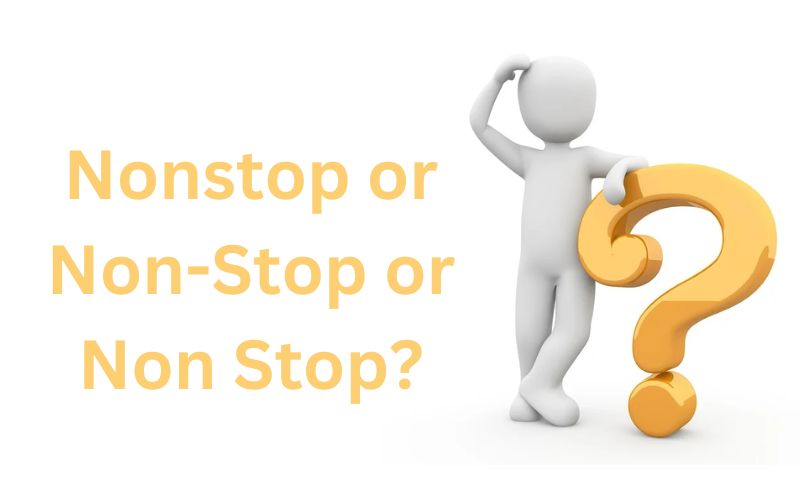Nonstop or Non-Stop or Non Stop? The word that denotes something that never stops may have been written in a variety of ways. If you’re American, you’ve probably used “nonstop” before. However, if you’re more accustomed to writing in British English, you’ve undoubtedly written it as “non-stop,” putting a hyphen between the words. The choice between “nonstop” , “non-stop” and non stop essentially comes down to the English language you’re speaking.
The difference between American and British English ultimately lies in the decision of whether or not to use nonstop. Consequently, non-stop and nonstop are both listed as correct in the Cambridge Dictionary. The one-word version is almost as common as the hyphenated version, according to this graph for the UK. Moreover, the US chart indicates that nonstop is far more typical than non-stop.
Nonstop Meaning and Usage
In the US and other parts of the world, including the UK, the term “nonstop” is most commonly spelled as one word. It describes something that proceeds continuously, like a journey, flight, or period of time.
Ex:
- The party went on nonstop until the early hours of the morning.
- His nonstop chatter filled the room with energy.
- The marathon runner kept up a nonstop pace for the entire race.
Furthermore, when writing in AP Style, you should always use this version.
Read also: Best Epic Adventure Captions for Instagram and Quotes
Non-stop Meaning and Usage
In the UK, the most commonly used spelling of the word is non-stop, though nonstop as a single word is not far behind. The terms non-stop and nonstop have the same meaning. You can select which version to use as long as you maintain consistency throughout your text.
Ex:
- The music played non-stop, keeping everyone on the dance floor all night long.
- The rain fell non-stop for hours, flooding the streets and causing chaos.
- He talked non-stop about his travels, recounting every detail with enthusiasm.
It is standard AP Style practice to omit the hyphen when the noun follows a compound word, such as non-stop. When writing a text in AP Style, you should use the single-word alternative nonstop instead of the hyphen rule in the case of non-stop.
Non Stop
It is wrong to use “non stop” as two words. US English tends to use the single-word form more often. In contrast, the UK uses the hyphenated version more frequently. Nonetheless, neither is any less accurate; the meaning remains unchanged.
This is due to the possibility of confusion caused by “non stop,” which merely treats “non” as a prefix rather than a separate word. Therefore, it’s always safer to stick with “nonstop” or “non-stop,” depending on the reader and whether you’re writing in British or American English.
Why Need to Hyphenate Non-Stop?
As “non-stop” adheres to the convention of hyphenating compound words, it is more common in British English. When confusion between the prefix “non-” and the following word could result from their combination, the hyphen is helpful.
When “non” is used as a prefix for “stop,” rather than as a separate word, it is made evident. The utilization of compound modifiers before nouns, such as “a non-stop flight,” can make clarity particularly helpful.
When to Use Which Form of This Word?
The audience and the situation will determine whether to use nonstop, nonstop, or non stop. To assist you in selecting the right form, consider the following guidelines:
- When writing in a formal or professional setting, or when adhering to established style guides is crucial, use the word nonstop as a single word.
- In compound adjectives or phrases where the omission of a hyphen could lead to misunderstanding, use non-stop with a hyphen to ensure clarity.
- In more informal or casual writing, use non stop without a hyphen, but be aware that it may cause confusion or ambiguity.
Conclusion
The use of hyphens and compounds is governed by specific conventions in both US and UK English. Although there are a lot of similarities between the two, authors should be aware of some differences as well.
Hyphenation is more common in US English, particularly in compound adjectives and phrases. On the other hand, British English frequently favors omitting hyphens unless they are required for clarity or to prevent ambiguity.





